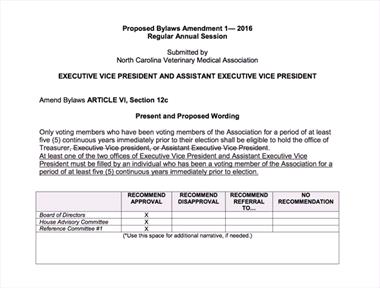AVMA opens top job to non-veterinarians

The AVMA’s chief executive can be a non-veterinarian as long as the assistant executive vice president is a veterinarian and has been a voting member of the association for at least five years. “We believe that future search committees and boards of directors should not be limited in their capacity to find the most qualified candidates …” reads a statement in support of nixing the requirement that veterinarians must hold the AVMA’s top two offices.
Click
here for larger view
That’s because the next AVMA top staff member doesn't have to be a veterinarian, a first since the organization's 1863 founding.
The change was made in early August, when the AVMA House of Delegates voted to lift the requirement that only veterinarians could be considered for CEO, a position also referred to as executive vice president. The CEO is responsible for guiding the AVMA, overseeing staff, implementing organization’s policies and strategic plan.
While Donlin's appointment is considered by many to be a natural replacement for Dr. Ron DeHaven, who's retiring after nine years, some AVMA leaders fear that future efforts to fill the role of CEO won't be as easy given the organization’s size and breadth.
AVMA membership numbers are approaching 90,000. Its annual budget is $35.5 million, and a recent treasurer's report put the AVMA's investment portfolio at $40 million.
"Very few" veterinarians are qualified to manage the AVMA, said Dr. Link Welborn, who spent several months on the search committee that vetted candidates to replace DeHaven.
Pushing to widen future applicant pools, he impressed upon AVMA delegates to lift the veterinarian-only requirement.
"I think we have to recognize that the vast majority of great leaders are not veterinarians," said Welborn, a delegate representing the American Animal Hospital Association. "I know the people in this room have a hard time believing that, but it’s true."
The majority of people in the room evidently shared Welborn's perspective: The measure passed by 71 percent.
Insiders at last month's House of Delegates meeting in San Antonio speculated that some leaders advocating for the change might be grooming certain non-veterinarian candidates for the CEO position. One name that came up was that of Adrian Hochstadt, a lawyer and certified association executive who spent a decade directing the AVMA’s state legislative and regulatory initiatives.
Hochstadt left the AVMA in 2015 to help run the North American Veterinary Conference but returned a few months later to take a job as deputy CEO, post previously held by Dr. Elizabeth Curry-Galvin, who retired.
During debate on the House floor, some delegates asserted that advocacy and management expertise can’t provide the AVMA CEO with the authority and perspective he or she might need to speak on topics unique to the profession.
That’s the upside of having a veterinary medical degree, said Dr. Gatz Riddell, alternate delegate of the American Association of Bovine Practitioners.
The job is “more than just managing the staff and the organization,” he said. “The position also requires to a large degree the representing of us as veterinarians to the public at-large. We believe that position is best filled by a veterinarian.”
Several delegates pointed out that the executive director of their state associations are non-veterinarians who do a good job promoting and advocating for the profession.
North Carolina delegate Dr. Karen Davis identified a “subtext” in the debate: “There’s a difference of opinion about who represents the organization to the public. Is it our CEO or our president?”
The AVMA president is elected annually by House delegates. Many in the profession consider the role to be more ceremonial and public-relations driven than critical to running the association.
Dr. Charles Freeman, a delegate from Oklahoma, pointed out that it’s not a search committee but the AVMA Executive Board — a 15-member body comprised of veterinarians — that ultimately hires the CEO.
“We should trust those veterinarians to make the right decision,” he said.